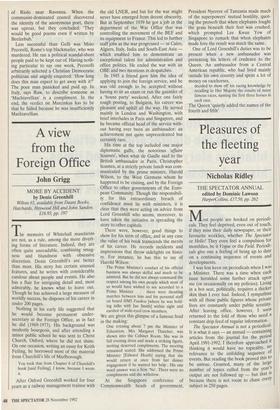A view from the Foreign Office
John Grigg
MORE BY ACCIDENT by Denis Greenhill Wilton 65, available from Daunt Books, Hatchards, Heywood Hill and John Sandoe, 116.95, pp. 197 The memoirs of Whitehall mandarins are not, as a rule, among the more divert- ing forms of literature. Indeed, they are often quite unreadable, combining smug- ness and blandness with obsessive discretion. Denis Greenhill's are better than most. His story has certain unusual features, and he writes with considerable candour about people and events. He also has a flair for intriguing detail and, most admirably, he knows what to leave out. Though he has achieved a large measure of worldly success, he disposes of his career in under 200 pages.
Nothing in his early life suggested that he would become permanent under- secretary at the Foreign Office, as in fact he did (1969-1973). His background was modestly bourgeois, and after attending a minor public school he was sent to Christ Church, Oxford, where he did not shine. On one occasion, writing an essay for Keith Feiling, he borrowed most of the material from Churchill's life of Marlborough.
You took that from Chapter 6 of Churchill's book [said Feiling]. I know, because I wrote it.
After Oxford Greenhill worked for four years as a railway management trainee with the old LNER, and but for the war might never have emerged from decent obscurity. But in September 1939 he got a job in the department of the War Office that was controlling the movement of the BEF and its equipment to France. This led to further staff jobs as the war progressed — in Cairo, Algiers, Italy, India and South-East Asia which enabled him to demonstrate an exceptional talent for administration and office politics. He ended the war with an OBE and two mentions in despatches.
In 1945 a friend gave him the idea of applying to join the foreign service, and he was old enough to be accepted without having to sit an exam or run the gauntlet of a 'house party' weekend. After one fairly tough posting, to Bulgaria, his career was pleasant and uphill all the way. He served mainly in London and Washington, with brief interludes in Paris and Singapore, and he became official head of the service with- out having ever been an ambassador: an achievement not quite unprecedented but certainly rare.
His time at the top included one major diplomatic gaffe, the notorious `affaire Soames', when what de Gaulle said to the British ambassador in Paris, Christopher Soames, at a strictly private lunch was com- municated by the prime minister, Harold Wilson, to the West Germans whom he happened to be visiting, and by the Foreign Office to other governments of the Euro- pean Community. Though the responsibili- ty for this extraordinary breach of confidence must lie with ministers, it is clear that they were acting on advice from Lord Greenhill who seems, moreover, to have taken the initiative in spreading the story to other capitals.
There were, however, good things to show for his term of office, and in any case the value of his book transcends the merits of his career. He records incidents and impressions that throw sidelights on histo- ry. For instance, he has this to say of Harold Wilson:
The Prime Minister's conduct of his official business was always skilful and much to be admired. But he did not always command the respect among his own people which most of us would have wished to see accorded to a Prime Minister . . . there were shouting matches between him and his personal staff on board HMS Fearless [where he was hold- ing talks with Ian Smith] within sight and earshot of wide-eyed crew members.
We are given this glimpse of a famous feud in the making:
One evening about 7 pm the Minister of Education, Mrs Margaret Thatcher, was shown into the Cabinet Room. She was in full evening dress and made a striking figure, inviting deserved compliments. The meeting remained seated. She addressed the Prime Minister [Edward Heath] saying that she would return at once from her dinner engagement if he wanted her help . His one word answer was a firm 'No'. There were no compliments and she withdrew.
At the Singapore conference of Commonwealth heads of government, President Nyerere of Tanzania made much of the superpowers' mutual hostility, quot- ing the proverb that when elephants fought the grass beneath their feet was crushed; which prompted Lee Kwan Yew of Singapore to remark that when elephants made love the result was much the same.
One of Lord Greenhill's duties was to be present when a new ambassador was presenting his letters of credence to the Queen. An ambassador from a Central American republic, who had lived mainly outside his own country and spent a lot of money on racehorses,
decided to show off his racing knowledge by recalling to Her Majesty the results of many famous races, naming the first three horses in each race.
The Queen 'quietly added the names of the fourth and fifth'.










































































 Previous page
Previous page